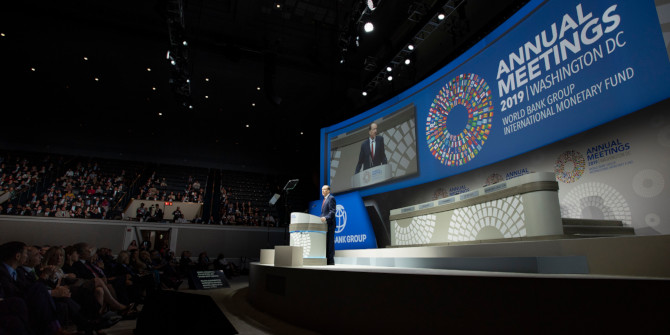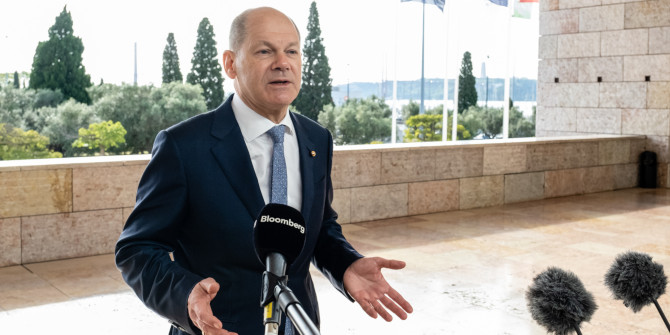Emmanuel Macron saw off challenges from both the far-right and the far-left during the French presidential election. Joseph Downing writes that with Macron unable to run for a third term, the door is open for Jean-Luc Mélenchon or another figure on the French far-left to win the presidency in 2027.
Emmanuel Macron made history when he won the 2022 French presidential election. He became the first French president since the creation of the Fifth Republic in 1958 with a parliamentary majority to win re-election. He now sits alongside two historical French political heavyweights who were awarded consecutive terms as president: François Mitterrand and Jacques Chirac.
The French constitution limits presidents to two terms, so for Macron this will be his swan song, whether he likes it or not. This could be interpreted as a carte blanche for Macron to go ahead with his much discussed reforms to the French state, retirement age and employment conditions. However, it is important to consider how the larger trends behind Macron’s rise within French politics will play out over the next five years.
Key here are the unprecedented tectonic shifts that have taken place in the French party system over recent years. The candidates representing the once mighty centre-left Socialist Party and the centre-right Republicans each slumped to under five per cent of the vote in the first round of the presidential election. These parties now appear for all intents and purposes to be finished as viable challengers for power.
What France is left with are increasingly polarised left and right parties and a personalised party built around Macron, who grudgingly represents the centre. This is extremely dangerous for France given Macron’s mandated departure in 2027 could result in a possible contest between the far-left and far-right. Regardless of which side emerged victorious, the outcome would be a radical government at the heart of Europe, and a clear challenge to the global economic and security order.
From La République en marche! to Renaissance
Many overlooked the magnitude of Macron’s achievement in 2017 because he was a centrist and a product of the Socialist Party. However, the victory of an ‘outsider’ candidate who had started his own movement was a precursor to the collapse of established party structures that we are now seeing.
Macron’s movement was always an extension of his own outlook and ideas. The personalised nature of La République en marche! was even visible in its name, which represented Marcon’s own initials. Following his victory in the 2022 presidential election, Macron immediately sought to address this by rebranding the movement as ‘Renaissance’. This is intended to be the first step in establishing a legacy party capable of holding the centre of French politics in 2027.
If this is to be achieved, the party will have to clear at least two major hurdles. The first is overcoming the personalisation around Macron that has been central to the movement’s appeal, as well as the somewhat inconsistent policy agenda the French president has pursued in office.
The fluidity of Macron’s agenda was apparent during the 2022 election, where he appeared to undergo something of an ecological ‘awakening’ between the first two rounds, subsequently promising a fast-paced ecological transition to voters. This was viewed by many as a cynical attempt to win support from left-wing voters and it underlined the fact that many citizens remain unsure about what his party actually stands for. It will be difficult for a party that lacks clear messaging to build lasting support following Macron’s departure.
Second, at present there is no person within the party who appears ready to act as a successor to Macron. The movement has essentially been built around a single individual and it is difficult to imagine the next five years will see the emergence of a new leader who can appeal to the electorate in the same way.
The death and rebirth of the left
The French left has simultaneously experienced a death and a rebirth in a far more radical form. The ‘death’ was the candidacy of Anne Hidalgo – the ex-Mayor of Paris – who ran for the Socialist Party in the presidential election and won a shockingly low 1.8% of the vote. Significantly, Hidalgo did not even score well in her back yard of the greater Paris Île-de-France region. This is from the candidate of a party who delivered the French president as recently as 2012.
However, the left is not as lifeless as it appears. Under the leadership of Jean-Luc Mélenchon, it has been reborn in a more radical, hard left form. Mélenchon finished third in the first round of the 2022 presidential election, dominating the vote in both the poor suburbs of Paris and the poorer neighbourhoods in the northeast of the capital itself.
Ahead of the legislative elections scheduled for 12 and 19 June, Mélenchon has achieved something significant by building a coalition of the left under his leadership. This has resulted in the Socialist Party accepting their role of playing second fiddle to the far more radical Mélenchon, who left the Socialist Party in 2008. Had such a coalition been present in the first round of the presidential election, it is possible Mélenchon could have progressed to the second round and defeated Macron in the runoff.
The policy agenda Mélenchon has proposed includes lowering retirement ages to 60, adopting a more Eurosceptic stance and renegotiating the EU’s treaties, putting caps on food prices, and withdrawing from NATO. These policies are likely to be tempered to a degree to keep the new left coalition intact, but even a watered-down version of this agenda would mean substantial upheaval for France and the global economic and security orders. The coalition of the left could perform strongly in the legislative elections, with the possibility of Mélenchon even laying claim to the role of prime minister – something that would paralyse Macron’s presidency and hopes for reform.
Where does the right go from here?
Marine Le Pen, with far less shock and panic than in 2017, made the runoff as the second most popular candidate in France. Le Pen has worked tirelessly to soften her image in France, rebranding the National Front as the National Rally and choosing to focus her 2022 campaign on issues such as inflation and purchasing power, which proved popular among voters. However, her classic anti-Islam platform remained important, with her policy proposals including a pledge to ban the wearing of the Islamic headscarf in public places. However, after a second loss, where do Le Pen and the far-right go from here?
Le Pen has high hopes for the legislative elections. She will be aiming to build on her somewhat paradoxical gains in French overseas territories, such as the predominantly Muslim Island of Mayotte in the Indian Ocean. However, of the main three players, Le Pen is the one most likely to follow the ‘if it’s not broken, don’t fix it’ mantra and continue business as usual.
This will involve maintaining a strong grassroots presence, shoring up her core support in the North and South, and playing the opposition card against Macron. While Le Pen is unlikely to go anywhere in the next five years, building a party bigger than her that a successor can steer to victory will be a major undertaking. At one point, Le Pen’s niece, Marion Maréchal, was viewed as a potential successor, but her alliance with Éric Zemmour during the 2022 presidential election underlined her move away from Marine and the Le Pen clan.
A far-left future?
The French party landscape has changed drastically since Macron’s rise to power. We are now entering a new era of hugely polarised politics, with Le Pen on the far-right, and a new, re-invigorated far-left coalition under Mélenchon challenging the fundamentals of the French, European and indeed global order. Much of the focus in the past has been on the far-right’s challenge to the status quo, but it is the left that is likely to be the larger threat to the French mainstream in the next five years.
This will be aided by three key factors. First, inflation, and the possibility of a global recession will cement the economy and social protection as key issues in France. Second, the left under Mélenchon will be able to articulate a protectionist outlook that has similarities with Le Pen’s platform, but while holding the ideological credentials as life-long socialists that she does not have.
Finally, the rejection of xenophobia by the left opens the door to ethnic minority voters, as well as many white French voters who have found themselves faced with the choice between a neo-liberal Macron they disagree with, or a more protectionist yet xenophobic Le Pen. It remains to be seen how things develop during Macron’s second presidency, but it is increasingly likely that the battle in 2027 will be defined by the far-left’s challenge to the existing order in France, Europe, and beyond.
Note: This article gives the views of the author, not the position of EUROPP – European Politics and Policy or the London School of Economics. Featured image credit: The Left (CC BY-NC-SA 2.0)






A fantastically written article indeed.
Thanks. Anne Hidalgo is not the ex-Mayor however, she remains incumbent since 2014